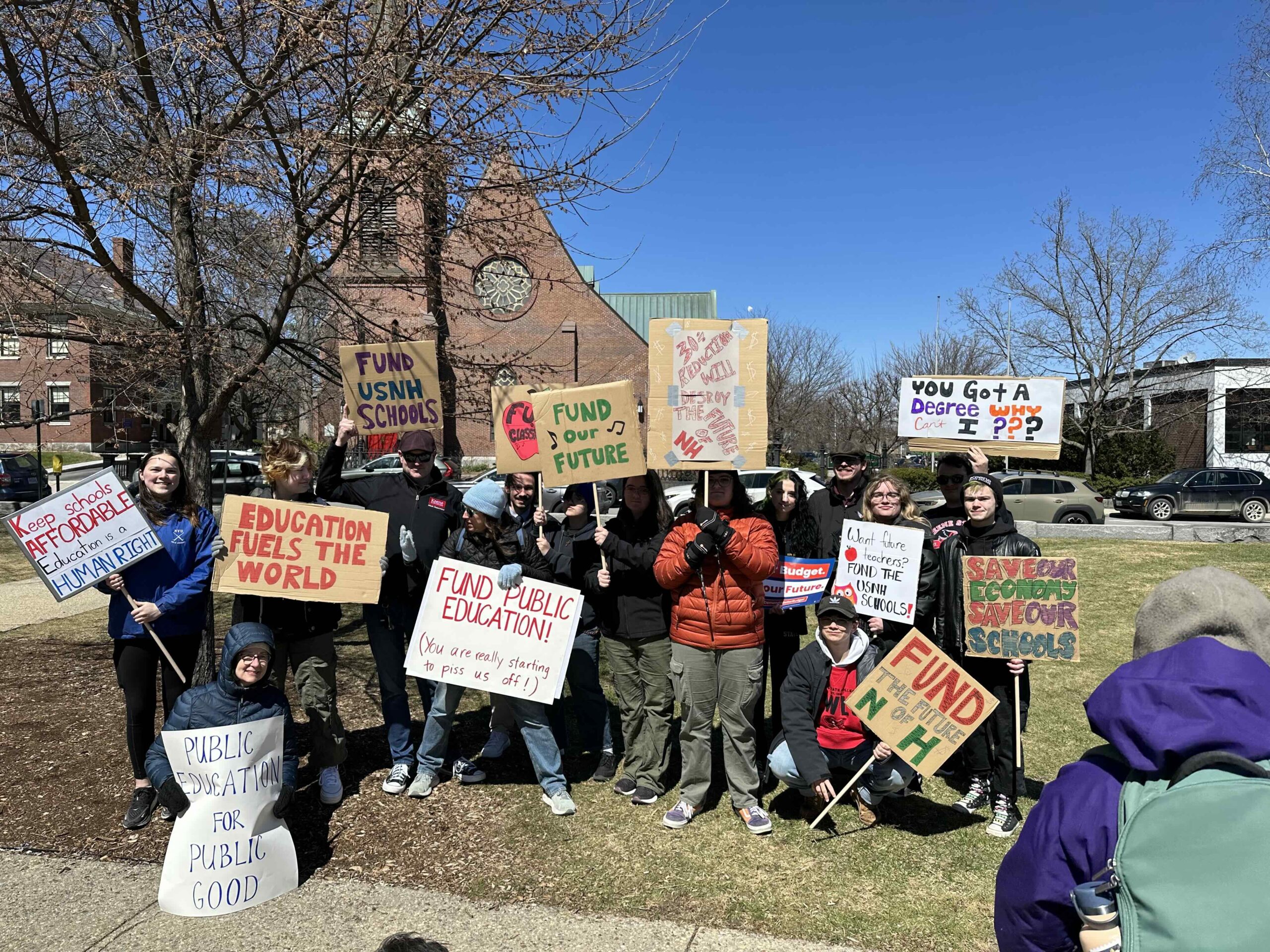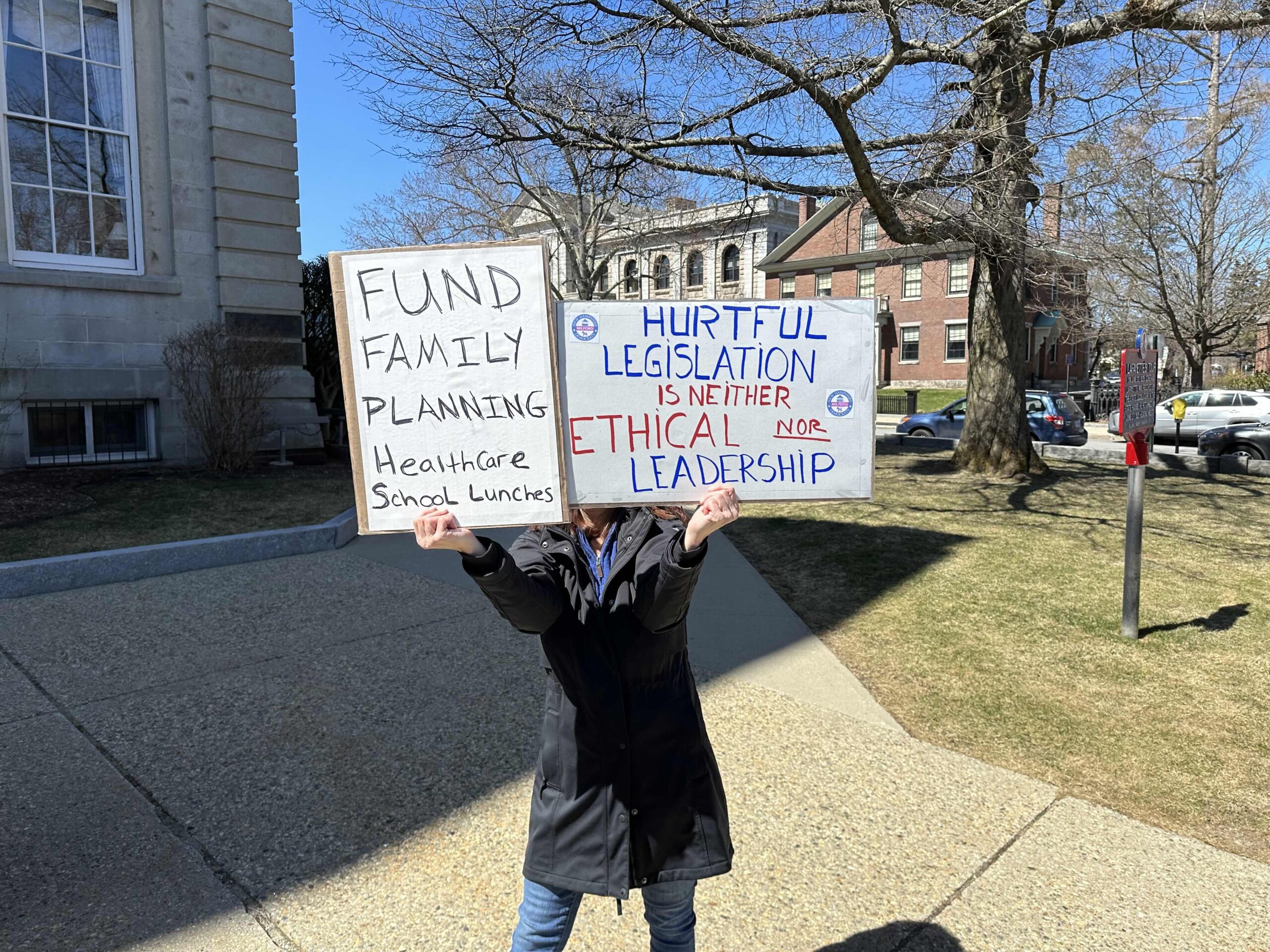Some 200 protesters gathered outside the New Hampshire State House Wednesday to blast the budget Republicans are hoping to pass today, denouncing the GOP’s spending cuts and proposal to cap local spending.
Inside, Republican Gov. Kelly Ayotte told reporters she isn’t much of a fan of the House budget, either.
“I am confident that the revenue numbers that I laid out in my budget are actually more accurate revenue numbers than the lower proposals made by the House, and that is being born out also by the first three months of the fiscal year and how revenues are coming in,” Ayotte said.
“I spent a lot of time on my budget, and I wouldn’t have put it together if I didn’t think it was the right blueprint for the state,” Ayotte added.
Both Ayotte and Democratic activists are unhappy with cuts in the House budget, an austere document after years of significant spending increases.

As the Josiah Bartlett Center for Public Policy points out in its analysis, the $5.62 billion in General and Education Trust Fund spending funded by state taxes (as opposed to federal dollars and other revenue) isn’t just lower than the current 2024-25 budget; it’s lower than the 2022-2023 budget and nearly as low as the budget passed in 2021.
This budget “effectively wipes out post-COVID state spending increases,” the Bartlett Center reports.
House Republicans insist the cuts are necessary after years of surging spending and the end of COVID-related federal funding. In fact, members of the House Freedom Caucus are calling for even deeper spending cuts.
“New Hampshire has long prided itself on fiscal discipline, and now is not the time to abandon those principles,” said Rep. Len Turcotte (R-Barrington). “We must make prudent decisions today to ensure economic stability tomorrow.”
Outside the State House, Democrats decried the cuts and touted what they call a “Better Budget.”
“The ‘Better Budget’ restores funding to programs across state government without adding or increasing a single tax,” House Minority Leader Alexis Simpson (D-Exeter) told the crowd.
“We return more money to cities and towns, relieving pressure on property taxpayers. We restore funding to our universities and college and community colleges, staving off the inevitable tuition hikes that would occur under a Republican budget. We support access to health care, removing the regressive premiums on Medicaid and restoring funding to family planning programs.”
 What Simpson didn’t tell the crowd was how Democrats plan to pay for those spending increases. Asked how Democrats plan to close the gap between projected revenues and their increased spending, Simpson told NHJournal they are counting on economic growth from their budget plan.
What Simpson didn’t tell the crowd was how Democrats plan to pay for those spending increases. Asked how Democrats plan to close the gap between projected revenues and their increased spending, Simpson told NHJournal they are counting on economic growth from their budget plan.
“Democrats propose investing in the economic drivers that make New Hampshire thrive, and we believe by doing that, there will be a higher revenues in the business,” Simpson said. As an example, she mentioned the GOP’s proposed cuts to the state’s tourism development budget.
“Our state thrives on tourism, and that’s what really helps business and increases revenues, and therefore increases our ability to do the programs we need.”
Rep. Joe Sweeney (R-Salem) mocked the Democrats’ budget plan as unserious.
“They drastically increased revenue projections in their amendment, against the bipartisan recommendation of the House Ways and Means Committee that the full House adopted unanimously earlier this year,” Sweeney posted on social media. “Their proposal is not a serious budget.”
However, Simpson and the Democrats have an ally in Ayotte when it comes to opposing cuts to the tourism development budget, and some other areas as well. The Republican governor told reporters she also opposed the GOP call to end funding for the state’s Arts Council and Office of the Child Advocate.
Ayotte is looking to the state Senate to get a spending plan closer to the one she proposed.
“There are many things that I’m going to be working with the Senate to prioritize and that I hope to get back in the priorities that were in my budget,” Ayotte said.
One area where she and House Democrats are definitely at odds is their claim that she supports a “Medicaid income tax” on some recipients.
“That is on its face ridiculous,” Ayotte told NHJournal. “What we’re talking about is a co-pay for health services and insurance that is provided to them from state and federal dollars.”
“And I find it ironic from the Democrats that they’re calling this an income tax when they themselves actually proposed income taxes,” Ayotte added.
Democrats call it an “income tax” because only Medicaid recipients who earn more than 255 percent of the federal poverty level — about $65,000 for a family of three — would pay the small deductible.
“By the way, half the states in the nation don’t even cover people with Medicaid at that level of income. And we’re also going to have a hardship provision to make sure that if there’s a hardship and you’re unable to pay, you still receive coverage,” Ayotte said.
“Those claims out there are just absurd.”





